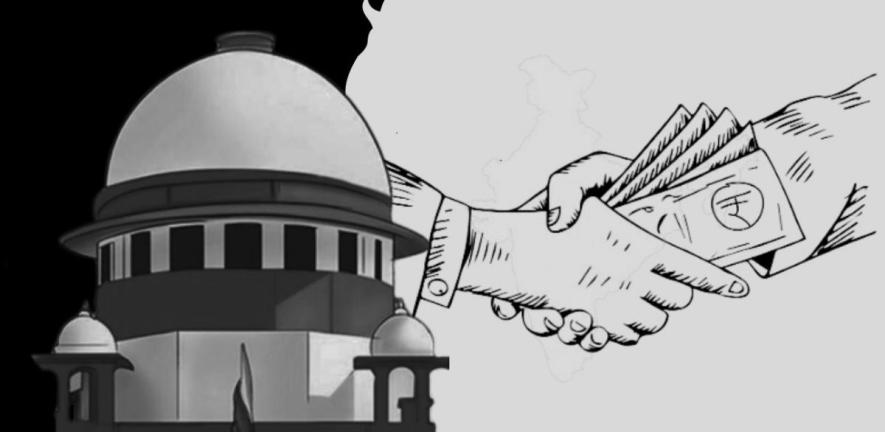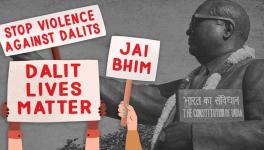Explained: SC Judgment on Sita Soren Case

The Leaflet explains why the Supreme Court has held that legislators cannot claim immunity from prosecution for bribery and privileges that are not essentially related to their functioning.
—
In an important ruling, the Supreme Court on Monday overruled the majority view taken by a five-judge Bench in P.V. Narasimha Rao versus State (1998), which granted immunity from prosecution to a member of the legislature who had engaged in bribery for casting a vote or speaking.
A seven-judge Bench comprising the Chief Justice of India (CJI) Dr D.Y. Chandrachud and Justices A.S. Bopanna, M.M. Sundresh, P.S. Narasimha, J.B. Pardiwala, Sanjay Kumar and Manoj Misra unanimously held that the ruling in P.V. Narasimha Rao had wide ramifications on public interest, probity in public life and parliamentary democracy and thus it could not allow the error in the case to be perpetuated.
The Bench held that corruption and bribery by members of the legislatures erode probity in public life.
What was P.V. Narasimha Rao’s case about?
In the general elections held for the Tenth Lok Sabha in 1991, the Congress emerged as the single largest party and formed a minority government with P.V. Narasimha Rao as the Prime Minister.
A motion of no-confidence was moved in Lok Sabha against the government. The support of fourteen members was needed to defeat the no-confidence motion. The motion was defeated with two hundred and fifty-one members voting in support and two hundred and sixty-five members voting against the motion.
The Bench held that corruption and bribery by members of the legislatures erode probity in public life.
A group of members of Parliament (MP) owing allegiance to the Jharkhand Mukti Morcha (JMM) and the Janata Dal (Ajit) JD (A) voted against the no-confidence motion. Notably, one MP belonging to the JD (A), namely, Ajit Singh, abstained from voting.
A complaint was filed before the Central Bureau of Investigation (CBI) alleging that a criminal conspiracy was devised by which the above members belonging to the JMM and the JD (A) had entered into an agreement and received bribes to vote against the no-confidence motion.
It was alleged that P.V. Narasimha Rao and several other MPs were parties to the criminal conspiracy and passed on “several lakhs of rupees” to the alleged bribe-takers to defeat the no-confidence motion.
A prosecution was launched against the alleged bribe-givers and bribe-takers, and cognisance was taken by a special judge, Delhi. The accused moved the High Court of Delhi to quash the charges. The high court dismissed the petitions. Appeals were preferred in the Supreme Court.
Before the Supreme Court, two major questions came up for consideration. First, whether by virtue of Article 105 of the Constitution, an MP can claim immunity from prosecution on a charge of bribery in a criminal court.
Second, whether an MP falls within the purview of the Prevention of Corruption Act, 1988, and who can be designated as the sanctioning authority for the prosecution of an MP under the Act.
Three opinions were authored in the case— by Justice S.C. Agarwal for himself and Justice Dr A.S. Anand, by Justice S.P. Bharucha for himself and Justice S. Rajendra Babu, and an opinion by Justice G.N. Ray.
Justice Bharucha, who was part of the majority judgment, held that the alleged bribe-takers who cast their vote against the no-confidence motion enjoyed immunity from prosecution in a court of law under Article 105(2) of the Constitution.
However, Ajit Singh (who abstained from voting) and the alleged bribe-givers were held not to enjoy the same immunity.
It was held that the provisions of Article 105(1) and Article 105(2) suggested that the freedom of speech for MPs was independent of the freedom of speech and its exceptions contained in Article 19.
MPs must be free of all constraints about what they say in the Parliament. A vote is treated as an extension of speech and is given the protection of the spoken word.
It was further observed that the expression “in respect of” in Article 105(2) must receive a “broad meaning” and entails that an MP is protected from any proceedings in a court of law that relate to, concern or have a connection or nexus with anything said or a vote given by him in the Parliament.
The allegation against Sita Soren was that she accepted a bribe from an independent candidate for casting her vote in his favour.
Justice Agarwal held neither the alleged bribe-takers nor the alleged bribe-givers enjoyed the protection of Article 105(2). An MP does not enjoy immunity under Article 105(2) from being prosecuted for an offence involving the offer or acceptance of a bribe for speaking or giving his vote in the Parliament or any committee.
In a separate opinion, Justice Ray concurred with Justice Agarwal’s reasoning that an MP is a public servant under the Prevention of Corruption Act and on the question regarding the sanctioning authority under the Act.
However, on the interpretation of Article 105(2), Justice Ray concurred with the judgment of Justice Bharucha.
Hence, the opinion authored by Justice Bharucha, on the interpretation of Article 105(2), represents the view of the majority of three judges of the Supreme Court.
What triggered the reconsideration of the P.V. Narasimha Rao case?
An election was held on March 30, 2012 to elect two members of Rajya Sabha representing Jharkhand. Sita Soren, belonging to the JMM was a member of the legislative assembly of Jharkhand.
The allegation against her was that she accepted a bribe from an independent candidate for casting her vote in his favour. But, as evident from the open balloting for Rajya Sabha seat, she did not cast her vote in favour of the alleged bribe-giver and instead cast her vote in favour of a candidate belonging to her own party.
The round of the election in question was annulled and a fresh election was held where Soren voted in favour of the candidate from her own party again.
Soren approached the Jharkhand High Court to quash the chargesheet and the criminal proceedings instituted against her. She claimed protection under Article 194(2) of the Constitution (an analogous provision of Article 105) relying on the judgment of the Constitution Bench in P.V. Narasimha Rao.
Interestingly, the high court declined to quash the criminal proceedings on the ground that she had not cast her vote in favour of the alleged bribe-giver; thus she was not entitled to the protection under Article 194(2).
Soren challenged the high court’s Order in the Supreme Court. On September 23, 2014, a two-judge Bench referred the matter to a three-judge Bench.
Soren approached the Jharkhand High Court to quash the chargesheet and the criminal proceedings instituted against her.
On March 7, 2019, a Bench of three judges observed that “having regard to the wide ramification of the question that has arisen, the doubts raised and the issue being a matter of public importance”, the matter must be referred to a larger Bench.
Eventually, on September 20, 2023, a five-judge Bench doubted the correctness of the majority view in P.V. Narasimha Rao’s case and referred the matter to a seven-judge Bench.
It is against this backdrop that the matter came up before a seven-judge Bench. The Bench has not decided the merit of the case filed by Sita Soren but has only limited itself to reference on the interpretation of Article 105 of the Constitution which confers privilege and immunity on MPs.
“105. Powers, privileges, etc., of the Houses of Parliament and of the members and committees thereof. (1) Subject to the provisions of this Constitution and to the rules and standing orders regulating the procedure of Parliament, there shall be freedom of speech in Parliament.
(2) No member of Parliament shall be liable to any proceedings in any court in respect of anything said or any vote given by him in Parliament or any committee thereof, and no person shall be so liable in respect of the publication by or under the authority of either House of Parliament of any report, paper, votes or proceedings.
(3) In other respects, the powers, privileges and immunities of each House of Parliament, and of the members and the committees of each House, shall be such as may from time to time be defined by Parliament by law, and, until so defined, shall be those of that House and of its members and committees immediately before the coming into force of section 15 of the Constitution (Forty-fourth Amendment) Act, 1978.
(4) The provisions of clauses (1), (2) and (3) shall apply in relation to persons who by virtue of this Constitution have the right to speak in, and otherwise to take part in the proceedings of, a House of Parliament or any committee thereof as they apply in relation to members of Parliament.”
The Bench, after citing precedents and the historical evolution of parliamentary privileges, held that members of the House or indeed the House itself cannot claim privileges that are not essentially related to their functioning.
The Bench also clarified that the delivery of results is irrelevant to the offence of bribery.
“To give any privilege unconnected to the functioning of the Parliament or legislature by necessity is to create a class of citizens which enjoys unchecked exemption from ordinary application of the law. This was neither the intention of the Constitution nor the goal of vesting the Parliament and legislature with powers, privileges and immunities,” the Bench held.
It thus ruled that the assertion of a privilege by an individual member of the Parliament or legislature would be governed by a two-fold test.
First, the privilege claimed has to be tethered to the collective functioning of the House, and second, its necessity must bear a functional relationship to the discharge of the essential duties of a legislator.
Coming to another aspect, do these privileges afford immunity to an MP or a member of a legislature who engages in bribery in connection with their speech or vote?
To this, the Bench ruled that Clause (2) of Article 105 does not grant immunity against bribery to any person as the receipt of or agreement to receive illegal gratification is not “in respect of” the function of a member to speak or vote in the House.
“Prosecution for bribery is not excluded from the jurisdiction of the criminal court merely because it may also be treated by the House as contempt or a breach of its privilege,” the Bench ruled.
“Corruption and bribery of members of the legislature erode the foundation of Indian parliamentary democracy. It is destructive of the aspirational and deliberative ideals of the Constitution and creates a polity which deprives citizens of a responsible, responsive and representative democracy,” the Bench said.
The Bench also clarified that the delivery of results is irrelevant to the offence of bribery. It added that under Section 7 of the Prevention of Corruption Act, the mere “obtaining”, “accepting” or “attempting” to obtain an undue advantage with the intention to act or forbear from acting in a certain way is sufficient to complete the offence.
“It is not necessary that the act for which the bribe is given be actually performed. The first explanation to the provision further strengthens such an interpretation when it expressly states that the ‘obtaining, accepting or attempting’ to obtain an undue advantage shall itself constitute an offence even if the performance of a public duty by a public servant has not been improper.
“Therefore, the offence of a public servant being bribed is pegged to receiving or agreeing to receive the undue advantage and not the actual performance of the act for which the undue advantage is obtained,” the Bench said.
The Bench noted that the majority judgment in P.V. Narasimha Rao did not delve into when the offence of bribery is complete or the constituent elements of the offence.
The Bench ruled that Clause (2) of Article 105 does not grant immunity against bribery to any person as the receipt of or agreement to receive illegal gratification is not “in respect of” the function of a member to speak or vote in the House.
However, on the facts of the case, the majority held that those MPs who voted as agreed were covered by the immunity, while those who did not vote at all (i.e., Ajit Singh) were not covered by the immunity under Articles 105(2) and 194(2).
“This erroneously links the offence of bribery to the performance of the act. In fact, in the impugned judgment as well, the high court has relied on this position to hold that the appellant is not covered by the immunity as she eventually did not vote as agreed on and voted for the candidate from her party,” the Bench opined.
Elections to Rajya Sabha are within the remit of Article 194(2)
The question is whether votes cast by elected members of the state legislative assembly in an election to Rajya Sabha are protected by Article 194(2) of the Constitution. On this question, the Bench held in the affirmative.
It opined that the vote for such elections is given in the legislature or the Parliament, which is sufficient to invoke the protection of the first limb of Articles 105(2) and 194(2). Such processes are significant to the functioning of the legislature and in the broader structure of parliamentary democracy.
The Bench held Articles 105 and 194 of the Constitution seek to sustain an environment in which debate and deliberation can take place within the legislature.
“There appears to be no restriction either in the text of Article 105(2) and Article 194(2) which pushes such elections outside of the protection provided by the provisions.
“Further, the purpose of parliamentary privilege to provide legislators with the platform to ‘speak’ and ‘vote’ without fear is equally applicable to elections to Rajya Sabha and elections for the President and Vice-President as well,” the Bench ruled.
It thus held Articles 105 and 194 of the Constitution seek to sustain an environment in which debate and deliberation can take place within the legislature. This purpose is destroyed when a member is induced to vote or speak in a certain manner because of an act of bribery.
Click here to read the order.
Get the latest reports & analysis with people's perspective on Protests, movements & deep analytical videos, discussions of the current affairs in your Telegram app. Subscribe to NewsClick's Telegram channel & get Real-Time updates on stories, as they get published on our website.
























